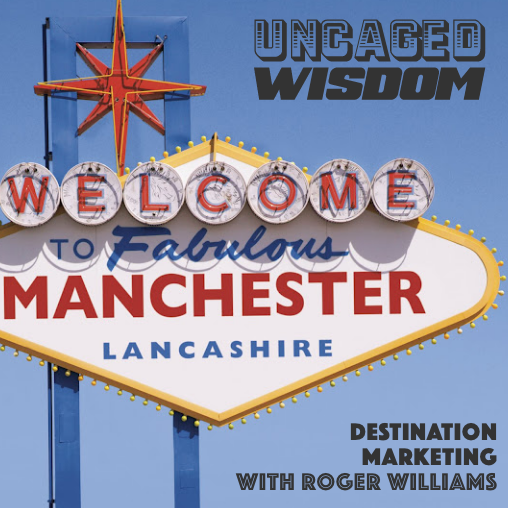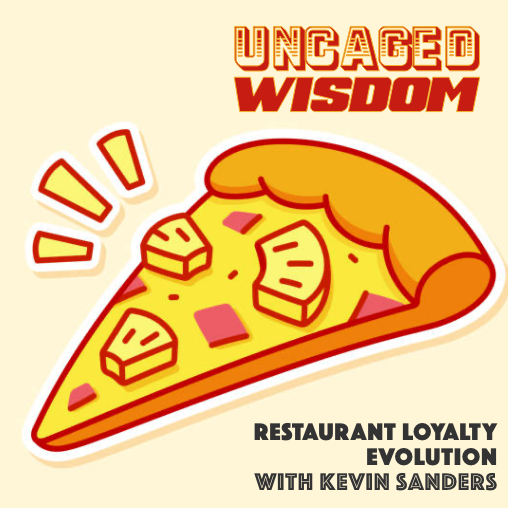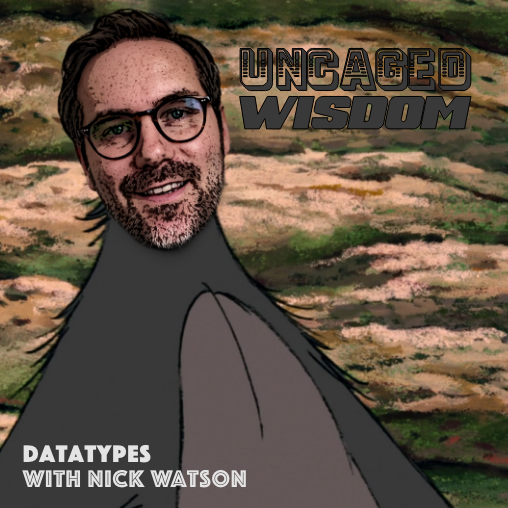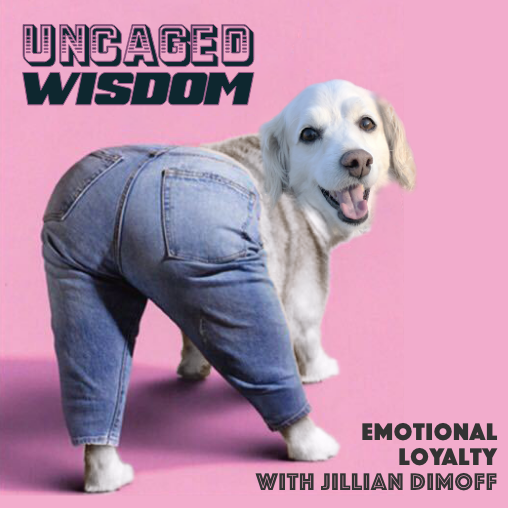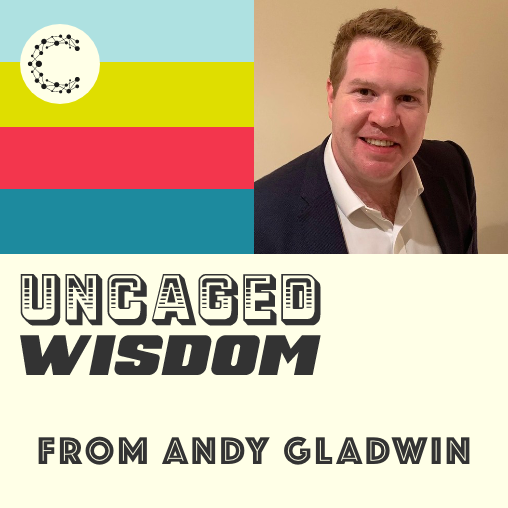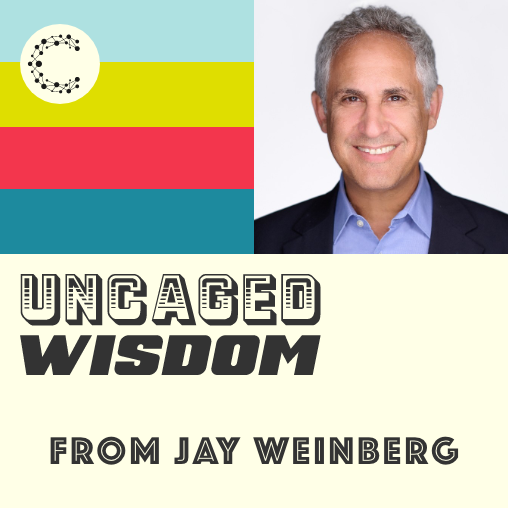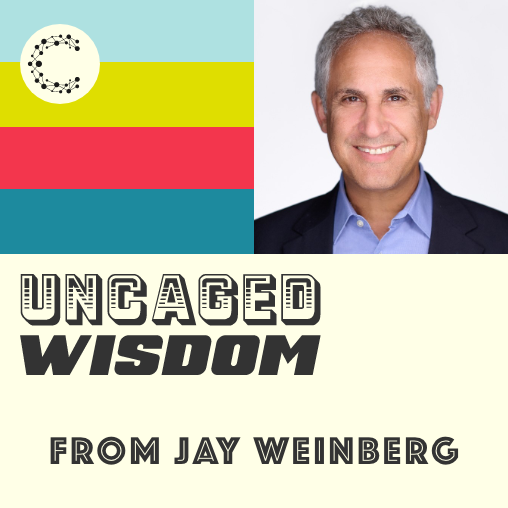Deep Dips: Mastering Destination Marketing w/ Roger Williams
- 0.5
- 1
- 1.25
- 1.5
- 1.75
- 2
Roger Williams: "Bleisure cruise" sounds way better than" bleisure cruise."
Julian Bracey-Davis: Leisure, leisure, bleisure, bleisure.
Diva Renton-Roderix: inaudible You say leisure, leisure. I say... Oh, yeah. Okay.
Roger Williams: We should just do a bit with just accents, right? We'll just call it Across the Pond and compare the American pronunciations versus the British.
Diva Renton-Roderix: That could be a whole podcast of itself.
Roger Williams: Things like Doug and dog.
Diva Renton-Roderix: Dog.
Roger Williams: Right? You know, all those things. Yeah.
Diva Renton-Roderix: Aluminum.
Speaker 4: Uncaged Wisdom: Deep Dips, the podcast where we take a quick but deep dip into the world of relationship marketing.
Julian Bracey-Davis: Hello, everybody, and welcome to yet another Uncaged Wisdom: Deep Dips, where today we are joined by a very special guest: Roger Williams. Hello, Roger!
Roger Williams: Hello, Julian.
Julian Bracey-Davis: Could you introduce yourself to our audience and basically tease out that voice of yours?
Roger Williams: Sure, absolutely. It's a pleasure to be here. I'm Roger Williams. I'm an enterprise strategy director here at Cheetah Digital. I recently joined Cheetah about a year ago coming from Sabre. Most of my background is in airlines and in loyalty programs. Started my career at an airline as a loyalty manager, and also working quite a few other roles, including being a ground agent, a check- in agent, just about everything else before I joined management, and then had the pleasure and honor of being involved in marketing and loyalty marketing and alliances for that airline. And then subsequent to that, started my own company called Airline Information, where we served a variety of airline managers, approximately two to 250 airlines worldwide, mainly in the loyalty space and other commercial areas with conferences and a knowledge base, and also consulting. Between that and Sabre, had a few startups, including a loyalty startup that involved Bitcoin, of all things.
Julian Bracey-Davis: Today we're talking destination marketing, which, not going to lie, is a term that you gave me, Roger, and I probably should have known it already.
Speaker 5: The worst vice is advice.
Julian Bracey-Davis: To start, though, Sympathy for the Devil's Advocate, where we chuck a statement at you, and really, we just get your sort of gut reactions on it.
Roger Williams: I'm scared.
Julian Bracey-Davis: I would like my favorite travel brand to stop pushing random destinations and discounts on me. Why can't they just offer me somewhere where I want to go?
Roger Williams: It's been an issue since the beginning of travel marketing, whether it's with airlines, hotels, or actual destination marketers. So we mentioned destination marketing before. Traditionally, in the travel space, we think of destination marketing more as tourist boards. But of course, airlines and hotels do it as well, because they are facilitating the transportation or the accommodation at a destination, so it's very much a partnership effort. Traditionally, a lot of destination marketing, particularly from airlines and hotels and travel agents, has been driven by yield and inventory management, essentially. So not necessarily where travel companies are concerned about what destination may resonate with you or what would you actually like to experience, looking into the level of sophistication of your persona. Because as you may know, personas change, going back to that really creepy movie where you could be literally two people, Julian. Or when you travel for business versus when you travel with your family. Completely different needs, right? And basically two different personalities, two personas. So there are all those psychographic requirements that travel companies need to work through in order to address that concern where," Why can't they offer me somewhere I want to go?" Because we've all seen those e- mails where you have that inaudible destination comes in your inbox. You look at it, and it takes you about maybe five seconds to delete it, because you quickly peruse. I mean, there might be some weather or bugs on there. There might be some beaches or what have you. But if you really look into it, they are sending that to you based on the fact that they need to put butts in seats or heads in beds, not necessarily because it's somewhere where they know that you would like to go.
Julian Bracey-Davis: When you're talking about yield and inventory management... So who's driving almost the... Is it like the cart before the horse in this case? Is it people who are looking at the yield inventory who are pushing the marketing and where marketing's going? So the marketers aren't really getting a chance to be creative and... Who's driving that decision traditionally?
Roger Williams: It is a financial or a revenue decision. Of course, there's a very sophisticated network of technology in the travel industry that will be able to determine seasonality and days of the week and essentially demand elasticity and align the availability of the inventory, whether that's an airplane seat or a room, align that with a demand. And so much effort and technology and money and investment goes into that that it essentially takes over the process, and it guides marketing, where it's going to then tell marketing," We need you to put your marketing efforts into these areas, because this is where we need to drive more traffic." It's as simple as that. And that's ubiquitous around the world.
Julian Bracey-Davis: Are you seeing that people realize this is perhaps not the most efficient way to satisfy the inventory needs or the revenue that is being targeted on the marketers and teams of travel companies?
Roger Williams: Yeah, and you said a key word: efficiency. It really is an inefficient process. So we're all e- mail marketers here for e- mail marketing company, and it's kind of akin to where you look at marketers moving from a batch- and- blast- type approach to more of a triggered or personalized approach in e- mail. It's very similar to that, where there's a lot of inefficiency if you're going to be marketing based on your revenue and yield requirements, because essentially, you're going to have to send out a lot more volume, you're going to have to touch the customer a lot more, and in the process, you are eroding that relationship. You're creating disengagement on subscribes, the entire gamut of that. And you're doing a lot of damage. So in order to compensate for that, you have to crank up your volume way above what you may need. That's going to hit your bottom line in terms of cost, so you're going to be sending out more e- mails, processing larger databases, customer lists, that sort of thing. When in fact, if you had a different approach that would be more aligned to what the customer really wanted, your conversion rate will be higher. It'll be a lot more efficient. So I think you called it very well there, Julian.
Julian Bracey-Davis: Well, I try. It's all that research I do of you before that no one knows about. People think this is all spontaneous.
Diva Renton-Roderix: This is a bit random, but while we're in devil's advocate mode, a term I've seen popping up more is bleisure, business leisure. And Roger, you were saying about the two personalities, but I guess with COVID and just people trying to take advantage of that travel when they are traveling for business, and that's just an interesting thing I've inaudible. Has that term been used for a while, or is that still quite new?
Roger Williams: That's a really brilliant point, Diva. It's not a new thing. So when I was a young marketing manager in the'90s, early 2000s, I actually used to task our reservations department to use their downtime in order to cross- sell when people were on trips, in particular, to look at business travelers that were traveling at the time closer to a weekend. And then we would literally go down the list and start ringing them up and say," Hey, you're in my..." Well, let's say you're you're in Atlanta or something, and" Do you want to take a side trip to Bermuda?" And the more information we had on that person, the better. So we could then say," Yeah, you're really into cave diving, and there's really great cave diving in the Bahamas. You're just 500 miles away from there on a business trip right now. Can we interest you in that?" So it's been around longer than I've been around, but it has really taken traction after COVID, because of course, folks working from home, and then the work- from- anywhere trend where people have literally picked up their entire families and hit the road and just gone everywhere renting Airbnbs and what have you. And they're taking calls during the day and mingling that with," Hey, let's go on a hike, let's go here, let's explore," and it's all kind of mashed up together. So COVID has been the catalyst for that and, I think, has coined that term" bleisure," but it's certainly been around for a long time, and travel marketers that have tried to be clever and really tried to get down to that personalization have been doing it for a long time. Just not a lot.
Diva Renton-Roderix: So bleisuring.
Julian Bracey-Davis: Yeah, a bit of bleisuring. We're going to split the main part of this into sort of two sections of destination marketers, things to consider of doing things a little bit differently. To kick us off, let's look at zero- party datas, one of our favorite subjects. It's something that we talk about a lot. You said something very interesting to me:" Destination marketing and zero- party data, a match made in heaven."
Roger Williams: They truly are a match made in heaven, guys. And the reason for that is what I was alluding to before, where coming from what the harm is. The problem was that it's all destination marketing that is being driven by revenue concerns and putting butts in seats and heads in beds. So the alternative of that and the solution is more about finding out what is it that people want to do. And in some cases, people may not even know exactly where they want to go, but if you're able to harness information about them that would allow you to piece it together and then create a recommendation on," Hey, this might be a really good location for you because you have these attributes," then that would be good. In order to do that, you simply have to ask, which is why these things coincide so well, zero- party data and destination marketing. So we could either... And it's generally better if it's a little bit more drawn- out, and the way I describe the second way where we are asking really smart questions that are capturing a variety of attributes that, using our experience, we can put those attributes together and create a destination recommendation for you, which we actually have done recently with our client, American Airlines, where we used Cheetah Experiences, and we created a recommendation engine, one that works so well that American is now integrating that into their future recommendation engines, which are mostly revenue management- based. And they were really impressed by this because of a couple things. One, it was super simple. It was two questions. And a lot of people actually got these. I was at a conference the other day, and I ran into someone that introduced themselves, and they're like," Oh, are you with Cheetah?" They're like," Did you know about this? I'm with AAdvantage, and I got this e- mail that had these two questions, and I thought it was really interesting. And then you guys gave me a destination recommendation." So the questions were essentially," What would you pack in your bag?" And the other one was," What kind of view do you want to wake up to in the morning?" And it's based on those two questions, and they were very graphic. So the responses were, you could click on a mountain view, beach, so on and so forth. And then what you pack in your bag, there were items that would align with leisure and items that would align with more business. So based on those combinations, and they were quite a few of those combinations, we created an algorithm and superimposed that with the airline's destinations, and we were able to use Cheetah's EDP to automatically create a recommendation that would feed back to the user instantly on," Hey, we think you should go here." And then we could continue to iterate that algorithm as many times as the airline wanted and feed that into e- mails that would then trigger and go to users. And in this particular case, that ran for several months where, with just one quiz where you answered two questions, didn't take a lot of time, we then were able to create a myriad of destination recommendations based on the places that the airline could possibly go.
Julian Bracey-Davis: What was the value exchange up front, or the incentive, to put it another way, for the user?
Roger Williams: Yeah, it's a really good question, and we actually A/ B tested in this particular campaign, and in many cases, we have some clients where the value exchange is the result. It is a recommendation. It is the promise from the brand saying that," Hey, we're using Cheetah's tools, and we are taking the time to get to know more about you so we can market to you more efficiently and in a more personalized way." In many cases, that actually works, and we're not giving the user any points or any money or anything at all. In most cases, that works really well. In the case of this example, we actually used AAdvantage miles, which are recognized and beloved, and it was to the AAdvantage member audience. And it worked even better in many cases. So we actually gave some miles for folks to complete the quiz, but we could tell that even without giving those points, people were just like," Whoa! This is different." And even the airline said," We really haven't done this before. I wonder how the customers are going to react." And they reacted really, really well, so it was kind of like a value- add value exchange to give those points.
Julian Bracey-Davis: What are some of the barriers to this being rolled out with either clients in the travel sector or just broadly? Because it's one of those things that, for us, and I know we live and eat it and breathe it every day, it just seems a sort of no- brainer, everyone should be doing this, part of my standard, day- to- day or month- to- month planning.
Roger Williams: Yeah, I think it's twofold. One, there could be a little bit of apprehension with the value exchange itself where there's apprehension on the part of the brand that," Well, if I don't give a value exchange, are people going to engage with this? Is it going to be worthwhile? Or maybe the value exchange that I have to offer may not be as powerful as I think." And I mentioned that I had a startup a long time ago that in 2012 was... I was giving away Bitcoin. I was giving away 50,000 satoshis just for clicking on a link. And not a single person did it. And I literally made a social media post just ranting, I think it was, like, 2013, like," What is wrong with you people?" All my friends, everyone:" You don't want any Bitcoin?" And the responses were," What's Bitcoin?" So fast forward today. The perception of Bitcoin is completely different. So it's a matter of timing and perception where, at a time when I was literally giving away Bitcoin and no one took me up on it is because no one knew what it was, or the people that did know what it was, maybe didn't necessarily see the value in it. So that's the first part of it, I think. And then the second part is really about activation. And that's probably the bigger part of the pie here, where we even have brands that will do this type of activity. And you can enable this in many ways, not just necessarily with us. It's just that our ecosystem is really well- integrated for you to do it in a very efficient way. Yet I've seen a lot of brands, usually the same ones that say that," Hey, we're all about personalization," but they're really not. And they're not using that zero- party data, that psychographic data. They're not able to activate it or activate it at scale. And by that, meaning that, like I described to you, how we activate it was, we put it into an algorithm, and we actually created a recommendation in two different formats, an instant recommendation and then recommendations that would come subsequent to that, and then installed, went towards an Evergreen component where we would continue to do that. Once the customer has been exposed to it, they're then going to start to expect it. So you want this pilot stage, and then you want that pilot stage to transition into an Evergreen component where you're going to continually use that zero- party data and make it part of your marketing. As a loyalty guy, I'll be remiss to not mention that loyalty programs really are the original zero- party data at scale and value exchange all in one. So a loyalty marketer worth their salt knew that just a few years after AAdvantage was launched in the'80s. Initially it was a competitive tool created by Brierley and Bob Crandall at the time. A few years after, when the data guys came in, they're like," Whoa, this is a lot of really, really good data." And loyalty programs have been the same since where they're giving you points and a variety of benefits and recognition in exchange for you sharing as much as possible. And now, with the younger generations, starting with millennials, it's even more so. All the stats lean towards," Hey, I will share as much with you as you want, as long as I'm going to get some clear value from that." That might include points, it might be cash back, or whatever have you. So that's been the original thing. The one thing is that, in my take on it, it had to do with my startup years ago, is that loyalty is, the way it rewards is backwards. We give the points after the transaction. And of course, that makes things like attribution a little complicated and makes for awkward conversations with CFO, which I've had quite a few in boardrooms, saying," Hey, did this actually motivate the transaction, or would they have purchased this anyway?" So in a zero- party data acquisition scenario where you're going to use loyalty as a value exchange, you're actually doing something else that's a paradigm shift in loyalty marketing, where you are now front- loading loyalty point incentives, actual loyalty currency, before the transaction, and you're rewarding as much as you want leading up to the transaction. So no strings attached, I'll give you 500 points just for clicking on this survey, and then you'll get 500 points for completing a survey, and then once the survey gives you the recommendation, like we talked about, I'm going to give you another 500 points just for clicking through on that recommendation. Then you go and you search, you book the destination that we recommended, and then you'll go ahead and earn your normal points. So we're not just giving points on the back end, but we're spreading out those points however you want to do it. If you don't want to give additional points, maybe you can reduce the points on the back end and invest that on the front end. However you want to do it, it still works, but we're spreading that out and basically controlling the funnel using loyalty marketing and making it more personalized by acquiring and activating zero- party data.
Julian Bracey-Davis: Loyalty programs, especially in this sector, they're well- established. They're complicated at times. In many ways, they are the marketing funnel. So how, if you're approaching some of the conversations and you're saying to them," With all due respect, your loyalty currently is a little bit backwards, because you're not actually driving the changes that you want," how do you approach it when it comes to refreshing some thought into something that's, right now, is quite half- baked?
Roger Williams: Very carefully. Because these are long- standing marketing practices, just like lack of personalization, where you literally have to remove the blinders from the marketer. And in many cases, articulating that doesn't always work, in terms of convincing the marketer or the decision- makers that be that in fact, you're not doing this as optimally as you can, and there are tools available and techniques available to do it a little bit differently, and that's going to gain exponentially higher results. So what we tend to do, from our experience on a strategy team when we're in a situation, is to push for a pilot. And I share that with a team all the time. It's like," Hey, let's put a date on there. Let's get to a pilot." And by creating the pilot program, it takes some of the pressure off where it's like," Hey, it's not permanent. Let's just try something and see if it works." Before we try it, we're going to lay it out. We're going to plan. We're going to create a hypotheses. We're going to say what we're solving for. We're very deliberate in our approach as consultants to reassure the customer. And then that even helps us more to make our case, once the pilot's complete and we start crunching those numbers and looking at the analysis to show that," Hey, this actually made a difference." And then that's when that eureka moment, that epiphany, happens, and you literally see it in the eyes of the marketer. And it's not something that you can communicate and express beforehand. They have to experience that.
Julian Bracey-Davis: So just to put everything in a nice little package, a travel package, you could say: Roger, thanks to you, we've uncovered a well- known issue in the destination marketing category. We've got to move away from being driven by revenue and yield, and as you said, butts on seats, heads on pillows.
Roger Williams: Heads in beds.
Julian Bracey-Davis: Heads in beds!
Diva Renton-Roderix: Heads on beds!
Julian Bracey-Davis: Butts in seats, heads in beds. So, we've got that, we've established that, and then to start to address it, because we're not trying to silver- bullet this. We're just trying to get people to think about their marketing a slightly different way in this sector. Roger, you made the great, great pairing of destination marketing and zero- party data, which really, at the core of it, is ask the people that you're trying to do more with what it is that benefits them, and then you can work out how you can provide it, because chances are, if you're offering that, more likely, people will be interested in doing it. Associated to that, at the heart of everything, loyalty programs were the original deposit of zero- party data. It's why, during the pandemic, especially all these huge valuations on loyalty programs maintained their level, because travel brands could show," We know a lot of good things about our customer base." And then looking a little bit at the loyalty programs, which are the original zero- party database, we interrogated the current tactics a little bit to see if, actually, we're doing it as well as we could. And again, another great point you made, especially around the value exchanges: Consider how your loyalty's set up. Is it actually a little bit backwards? Are you really distributing your points and your rewards in the most efficient manner to drive the behaviors that you're after? And if everyone just listens to you, Roger, they will sort everything out, and they will be number one in the bleisure segment.
Diva Renton-Roderix: I know that outside of your life at Cheetah, you are a photographer and video content creator. I was having a little peek at your website.
Julian Bracey-Davis: Sneaky.
Diva Renton-Roderix: I was captured by the aerial cinematography. That really caught my attention, with the drone in the thunderstorm. This brought to mind for me that old industry saying:" Don't work with animals or small children." No mention of Mother Nature there or extreme weather conditions. Do you have any kind of content creation mantras, and also any interesting situations that come to mind that you've gotten into?
Roger Williams: I tell you, I've gotten in a few interesting situations with the drone. I've been a photographer and a little bit... I mean, since the film days. And I don't like to say cinematographer. It sounds really... I mean, I've done some TV stuff, but commercials, so I'm a videographer, I say. And during COVID, I decided to get my FAA pilot's license, because you can't charge for drone footage unless you have that license, so I had some extra time on my hands, and I got it. So the first couple times, my drone got caught in a storm, and my first paid drone job was a$ 52 million mansion in Aspen, and I ended up crashing the drone, and it hit a tree, and it knocked over a whole five- gallon bucket of paint that these bespoke painters were using to paint a five- car Tesla garage. And the house manager comes out. I called him Higgins. And he says," Do you always land your drone on a bucket of paint?" And I was like," Well, something's interfering with the drone." It was going haywire. I couldn't get it calibrated. What's the deal? And he says," Well, maybe it's because our roof is made out of copper." So basically, I was flying around a$ 52 million Tesla coil. So the drone definitely has some interesting stories, and that's just really recently in, I guess, my foray as an image maker. But my longtime mantra, to answer your question, is really about expression and gesture. I used to photograph weddings as well, which I don't anymore. And weddings are really fun out here, but in particular, being a wedding photographer for some time as well, the gesture's really important, where instead of just a mother and daughter standing there at a window and she's getting ready with her dress and all that, I try not to interfere. And then I would say," Hey, Mom, why don't you just put your hand on her shoulder?" And that makes all the difference. Or it's a certain expression. So if you look at a lot of my work, I try to get a certain expression and some type of gesture, especially if there's more than one person in the frame. And that tends to work really, really well, and it's something I fall back to all the time.
Diva Renton-Roderix: Great advice. And how did the relationship end up with the$ 52 million mansion and the paint? Are you going to be doing more work there, or...
Julian Bracey-Davis: Well, he's got a drone with really nice paint on it. That's what I'm going to say.
Roger Williams: So the drone was okay. It broke a propeller. The paint, it was actually stain. It was a special stain, and it spilled through the whole driveway. I mean, it was bad. So Higgins said to the painters, he just turned to them after he asked me if I regularly crash a drone and stuff, and he's like," Well, you have solvent to clean this up, don't you?" And they're like," Yeah, okay." And he's like," Well, problem fixed." And that was it. I was like," Whew!"
Diva Renton-Roderix: All's well that ends well.
Julian Bracey-Davis: But Roger, we can't let you go without saying a little bit of your England/ Manchester stories, and we've already hit on the accent, so take us back to the homeland.
Roger Williams: Yeah, those were the good old days in Madchester. Which, by the way, I am a subject of the queen because I was born in Jamaica in the Commonwealth. And I just pretty much grew up in the U. S. Hence, the lack of a Jamaican accent. So indeed. Manchester... I went to graduate school in the University of Salford, which is a tiny town adjacent to Manchester. Lots of dodgy pubs that include a lot of fights where basically all their pint glasses are broken and pool cues and that sort of thing. And this was in the'90s, and it was kind of the heyday of the music scene in Manchester. And I had the pleasure of meeting some really notable musicians and had a pint with them, guys like Peter Hook from New Order. And it was great. And north of the Gap, it reminds me of back home in Jamaica, where we're really not impressed by celebrities. We just treat them like ordinary people. And that's how it was in Salford, Manchester as well. You know, Beckhams would be walking by and all that sort of thing. It's just another day. Really fun, and one of my favorite parts of the U. K.
Julian Bracey-Davis: You were mentioning it's more... you hit the peak of Oasis.
Roger Williams: Yeah, mid-'90s. And those guys would walk into a bar every now and then, and they weren't necessarily graciously accepted, because they really thought they were, you know...
Julian Bracey-Davis: The dog's bollocks?
Roger Williams: The dog's boll... That's it. Yeah. So everyone would be like," Oh, God, it's the Gallagher brothers." But yeah. I mean, it was exciting times in Manchester, and it was just a magical moment. It was a really exciting city for music, and a lot of great music came out of there that influenced not just the alternative scene in the U. K., but all over the world. It was really, really cool.
Speaker 4: Uncaged Wisdom is shot in front of a live audience, mainly producer Jennifer Yeadon, hosted by Julian Bracey- Davis and Diva Renton- Roderix. Subscribe for even more deep dips.# justthetipoftheiceberg. Cheetah Digital. 2022, y'all.
DESCRIPTION
This week's edition of Uncaged Wisdom: Deep Dips is all about destination marketing(or travel marketing) with Roger Williams. Roger is an Enterprise Strategy Director at Cheetah Digital, specializing in loyalty marketing and programs. He shares the ins and outs of travel marketing with us, emphasizing that if we align our marketing approaches with what our customers want, our strategies can be more successful. Listen now for insight into bringing zero-party data and destination marketing together and how you can help your clients refresh their loyalty programs.
Today's Guests


